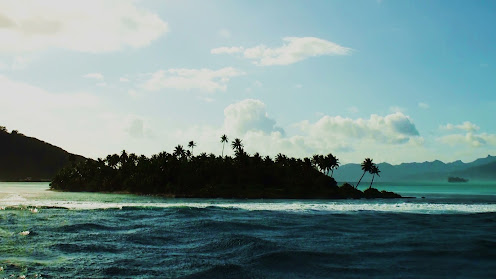Books
Sometimes, the inspiration for making or playing games goes hand in hand with something else. Today, I'd like to talk about one of those things - BOOKS!
I believe that books contribute a lot to the world of games. Reading words on a page conjures visions in our heads that allow us to ride on waves of imagination, and the practice of this lends a vividness and heightened sensory realism to our gaming experience.
My favorite book, since I was young, is Kon-Tiki. It's a true adventure story about a team of explorers who dare to sail across the Pacific by raft.
I've had several copies of this book, and I like the library bound version with the debossed imprint on the cover. This is the symbol that adorned the sail on the raft.
I stumbled on this book by accident. I passed by a bookcase one day, and randomly picked it up. "The Greatest Sea Adventure of our Time!" shouted the cover on the small paperback. I meant to just skim through the first paragraph and then put it down, but I was completely hooked from the first page. I sat next to the bookshelf and kept on reading, not being able to stop. The story was fascinating to me, and every detail caught my attention. It's one of those books where you can picture the sights, smells, sounds, and feelings without even trying.
I regret to say that I hadn't even heard of this story until that day. I'm glad that a chance passing by of the bookshelf, and my grabbing the book for no particular reason other than to read something random, led me to this great tale.
I enjoyed this book so much that I longed to travel to some of the locations described so vividly. After years of working hard to save some money, I was able to see a few of them. The first place was where the adventure started, and where the Kon-Tiki Museum now stands: Oslo, Norway.
I flew into Oslo during a snowstorm, and the place looked amazing. I don't know how to describe why I like it so much. It's clean and modern, the people are hard working and helpful, and the infrastructure is impeccable. There's so many things that are great about this place.
There are also parts of the book that take place in the South Pacific. I had to try to find a way to make it down there. The very warm tropical breeze hit me hard while exiting the plane in Tahiti, contrasting greatly to exiting the plane in frigid Oslo.
I made my way around some of the islands by cargo boat, which is great for travelers on a budget. They are slow going, but it forces your mind to relax and get into the rhythm of the islands. This place is awesome.

The second book I like is a very old one: The Tao Te Ching. It is an Ancient Eastern book of wisdom. It has been translated many times over the years, and the translations differ quite a bit. But the essence of the book is still there in most editions. One line I like goes something like, "What is a good man, but a bad man's teacher? What is a bad man, but a good man's charge?" It reminds me that sometimes instead of just judging people that make you feel negative, you can try to share your positive nature with people you meet.
I know that often times when a book is very old, and has had many translations, original truths or insights are sometimes lost. Even if for some reason one does not understand (or even misunderstands) things like the Tao Te Ching, the important thing is that you are a better person for whatever you got from it. It's like the old saying, "A finger pointing to the moon is not the moon," meaning the book (finger) is not the answer (moon), but rather what you get from the book to use in the future is what's important. I also enjoy the artwork that accompanies books like this.
Finally, we come to a Japanese poetry tradition known as haiku. Many people have probably heard of it. I like it a lot.
I enjoy the minimalism of this form of writing. The creators try to squeeze as much visceral experience into these tiny wordings as possible, and their craft is impressive. One of the old masters is known as Matsuo Bashō, and he is a good place to start if you'd like to read some of the good stuff.
I would love to be able to write Haiku in the traditional sense, but it is actually kind of intricate. For example, there needs a "cutting word" ("kireji" in Japanese). That is a difficult concept for me to grasp because I'm not Japanese, and kireji is one of those ideas that's not very easy to explain in terms of an English equivalent. Still, these poems are beautiful. I always try to imagine what my senses would experience, and what my emotions would feel, if I was a witness to the situation depicted in each haiku.
Well, that's it for today!
Do you have a favorite book? What kind of stories do you like to read?
Until next time, take care!















